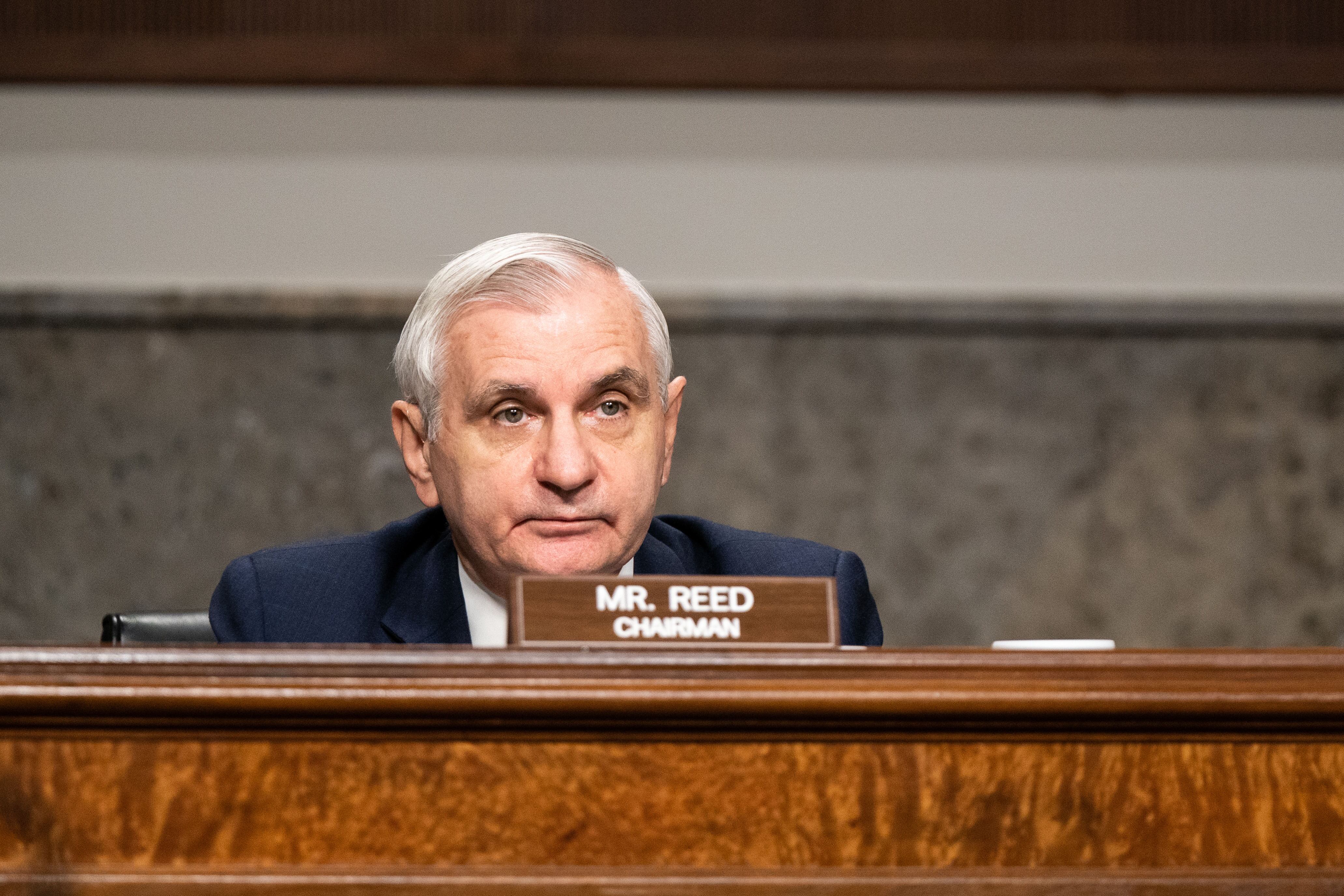WASHINGTON ― Mike Brown’s withdrawal from consideration as the Pentagon’s acquisitions chief has become an obstacle for the Biden administration’s efforts to tap innovative tech firms to compete with China, and top lawmakers say they want the president to quickly find a qualified candidate for the role.
Senate Armed Services Committee Chairman Jack Reed, who serves as a key gatekeeper for Pentagon nominees and policy, told Defense News that the job of undersecretary for acquisition and sustainment ― which involves the tricky balance of affordability, modernization and cohesion between systems ― is “a critical job.”
“You have to find the best possible candidate, not simply just filling the job,” said Reed, D-R.I. “Then that candidate has to be vetted, and it takes a while. So there’s a process of very, very rapidly identifying a top-notch candidate and then as fast as possible getting him vetted.
“That’s a key position, and without that position being filled you’re going to require a lot of people to have multiple duties and not just one responsibility.”
In another setback for the Pentagon, the official performing the duties of the job Brown was to take, Stacy Cummings, is expected to depart in the coming weeks, Politico reported Friday.
Pentagon spokeswoman Jessica Maxwell confirmed the report for Defense News, said the department had succession plans in place and that its acquisition work would go unhindered by Brown’s withdrawal. “The department’s work on acquisitions and focus on mission continues, guided by the expertise of the professionals in Acquisition and Sustainment,” she said in a statement.
Between the White House vetting a new nominee and the Senate’s crowded schedule, announcing and confirming a new candidate before Congress leaves town for its August recess could be a heavy lift. Reed’s panel will be occupied next week with its markup of the annual defense policy bill, but he said he could try to advance the nominee before August if the administration produces one that soon.
Brown said he withdrew from the running on July 13 because an ongoing investigation into allegations against him were expected to take up to a year to be resolved. The DoD inspector general is probing allegations that Brown violated federal hiring practices while serving as director of the Defense Innovation Unit, the Pentagon’s Silicon Valley outreach arm ― allegations he denies.
“Due to lengthy delays in proceeding with his nomination, Michael Brown has chosen to ask the President to withdraw his nomination to the Department of Defense,” White House deputy press secretary Chris Meagher told Defense News in a statement. “We agree that this is the best course and will be immediately moving to fill this critical role.”

The likely delay in filling the job comes at an inopportune time for President Joe Biden, who focused his Pentagon budget proposal on divesting legacy weapons systems in favor of research and development.
Reed is not the only one who wants the White House to move fast. “I hope they have somebody that they send over quickly. I know Mike, he’s very talented,” said Virginia Democratic Sen. Tim Kaine, who chairs the SASC Subcommittee on Readiness and Management Support. “I was very discouraged when I heard that, and I hope they will send us somebody top-notch very fast.”
Meanwhile, the Pentagon has only one nominee offered for its acquisitions arm: Deborah Rosenblum, who was tapped for assistant secretary for nuclear, chemical and biological defense programs. Vacant positions include the deputy undersecretary for acquisition and sustainment, the assistant secretary for sustainment, the assistant secretary for acquisition, and the assistant secretary for industrial base policy.
Arnold Punaro, a former SASC staff director and the current board chair of the National Defense Industrial Association, suggested the administration could fast-track the process by redirecting another nominee or offering a one who has already been through the confirmation process. However, Punaro and other observers agree there is no obvious replacement for Brown as yet.
There were high hopes for Brown’s ability to reform the Defense Department’s purchasing practices to prioritize nontraditional companies offering innovative solutions, an area considered key in winning the military technology race with China. A tech sector veteran, Brown spent nearly three years as director of the Defense Innovation Unit, where he focused on connecting small, innovative companies with departmental components.
Experts say it will be a challenge for the White House to find a nominee like Brown. He had a unique understanding of government acquisition and the needs of cash-strapped startups offering transformational technologies, and how that translates to the department’s competition with China.

“There are so few people that get this,” said Bill Greenwalt, nonresident senior fellow at the American Enterprise Institute and former deputy undersecretary of defense for industrial policy. “There are so few people who have an understanding of the ability of Silicon Valley and small business innovation to radically change the Department of Defense. And Mike Brown was one of them.”
Former Rep. Mac Thornberry, who led acquisition reform efforts in Congress for years as House Armed Services Committee chair, felt much the same way.
“I think it’s a loss, really, for the country because of his background in industry, his knowledge of finance: what it takes for private companies to come up with financing, the investment to do business with the government,” Thornberry said. “I just thought that was a home run, and now it’s not.”
The next undersecretary for acquisition and sustainment will be charged with quickly developing cutting-edge systems and turning them into formal programs, especially if the Pentagon plans to retire legacy systems. It’s an area where the Pentagon has historically lagged, and it happens to be the specialty of the Defense Innovation Unit.
Thornberry said that, generally, the lack of confirmed nominees undermines the Biden administration’s goals of making tough and contentious decisions on the Pentagon’s investments.
“Any acting person in any capacity is going to be hesitant to make big decisions,” Thornberry said. “It will be hard to impossible to make significant decisions with the number of acting folks that they have.”
Joe Gould was the senior Pentagon reporter for Defense News, covering the intersection of national security policy, politics and the defense industry. He had previously served as Congress reporter.
Andrew Eversden covers all things defense technology for C4ISRNET. He previously reported on federal IT and cybersecurity for Federal Times and Fifth Domain, and worked as a congressional reporting fellow for the Texas Tribune. He was also a Washington intern for the Durango Herald. Andrew is a graduate of American University.





